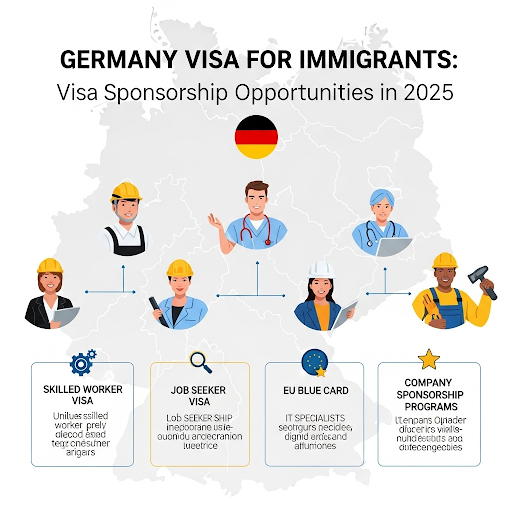The United Kingdom’s £2.3 trillion economy relies on skilled workers to drive industries such as healthcare, technology, engineering, education, and finance, which collectively employ over 15 million professionals.
Facing a persistent skills shortage, with 1.2 million vacancies reported in 2024 by the Office for National Statistics (ONS), the UK actively recruits international talent through the Skilled Worker visa, introduced post-Brexit to replace the Tier 2 visa.
This visa enables foreign workers to fill roles requiring specific qualifications or experience, offering salaries from £38,700 to over £100,000 annually and opportunities in cities like London, Manchester, and Edinburgh.
This guide provides a comprehensive roadmap for finding Skilled Worker visa sponsorship jobs in the UK for 2025, detailing the job market, visa processes, requirements, application strategies, benefits, challenges, and practical tips.
Drawing on data from the UK Home Office, ONS, UK Visas and Immigration (UKVI), and industry sources, it equips international professionals with the tools to secure roles and thrive in the UK’s dynamic economy.
Skilled Worker visa jobs span diverse sectors, from nurses in the NHS to software engineers at tech giants like Google. Employers such as Deloitte, BAE Systems, and Guy’s and St Thomas’ NHS Trust are among thousands of Home Office-approved sponsors recruiting globally to address shortages, particularly in high-demand fields like IT, healthcare, and construction.
With over 120,000 Skilled Worker visas granted in 2024, primarily to workers from India, Nigeria, and the Philippines, the UK remains a top destination for career growth.
This article outlines actionable steps to navigate the job market, obtain sponsorship, and build a future in the UK, whether coding in London’s Silicon Roundabout or teaching in Birmingham’s schools.
The Skilled Worker Job Market in the UK 2025
Overview and Trends
The UK’s labor market, with 33 million workers, faces a skills gap exacerbated by Brexit, an aging workforce, and technological advancements. The ONS projects 1.3 million job openings annually through 2030, with 60% requiring skilled qualifications. Key drivers include:
- Skills Shortages: 36% of vacancies (432,000) are skill-related, per the Employer Skills Survey 2024.
- Sector Growth: Healthcare (£150 billion), tech (£290 billion), and finance (£132 billion) lead demand.
- Post-Brexit Recruitment: Loss of 1.1 million EU workers since 2016 increased visa sponsorship.
- Government Initiatives: £4.3 billion in training and migration funding for 2024-2026 targets shortage occupations.
- Global Competition: London ranks 2nd globally for tech talent, attracting firms like Microsoft.
High-Demand Roles and Locations
Skilled Worker visa-eligible roles (Regulated Qualifications Framework, RQF, Level 3 or above) include:
- Healthcare: Nurses (SOC 2231), doctors (SOC 2211), pharmacists, and physiotherapists.
- Technology: Software developers (SOC 2137), data scientists, and IT analysts (SOC 2135).
- Engineering: Civil (SOC 2121), mechanical (SOC 2122), and electrical engineers.
- Education: Secondary teachers (SOC 2314) in STEM and ESL.
- Finance: Accountants (SOC 2412), actuaries, and financial analysts.
- Construction: Quantity surveyors (SOC 2433) and architects (SOC 2431).
Top regions for visa-sponsored jobs:
- England: 1.1 million vacancies, with London (400,000), Manchester, and Birmingham leading.
- Scotland: 80,000 vacancies, centered in Edinburgh and Glasgow.
- Wales: 40,000 vacancies, with demand in Cardiff.
- Northern Ireland: 20,000 vacancies, focused in Belfast.
- High-Wage Areas: London (£50,000-£100,000), South East (£40,000-£80,000).
Wages and Employers
- Median Salary: £38,700/year (minimum for Skilled Worker visa, unless on shortage occupation list).
- Entry-Level: £38,700-£50,000; senior roles earn £60,000-£120,000.
- Benefits: Bonuses (£2,000-£20,000), pensions, and relocation packages.
- Major Employers:
- Healthcare: NHS Trusts (e.g., King’s College Hospital), Bupa, Spire Healthcare.
- Technology: Google, Amazon, Arm, Sage.
- Engineering: BAE Systems, Rolls-Royce, Balfour Beatty.
- Finance: Deloitte, PwC, Barclays, HSBC.
- Education: Academies Enterprise Trust, Ark Schools.
- Recruitment Agencies: Hays, Manpower, Michael Page, sponsoring skilled roles.
Job boards like Indeed (5,000 visa-sponsored skilled jobs), LinkedIn (3,500 jobs), and Totaljobs (2,000 jobs) list opportunities, with hiring peaks in spring (March-May) and autumn (September-November). Strong English proficiency is required, with IELTS or equivalent often mandatory. The next section details the Skilled Worker visa.
Skilled Worker Visa Overview
The Skilled Worker visa is the primary route for non-UK residents to work in skilled roles, replacing the Tier 2 (General) visa in 2020. Below is an overview based on UK Home Office guidelines.
Key Features
- Purpose: For RQF Level 3+ roles (e.g., nurses, engineers) with sponsorship by approved employers.
- Eligibility: Job offer from a Home Office-approved sponsor, English proficiency, and salary meeting £38,700 (or lower for shortage occupations, e.g., £30,960 for nurses).
- Duration: Up to 5 years, extendable, with eligibility for indefinite leave to remain (ILR) after 5 years.
- Costs:
- Visa fee: £551 (3 years) or £1,500 (5 years) for standard roles; £247/£551 for shortage occupations.
- Immigration Health Surcharge (IHS): £1,035/year (e.g., £3,105 for 3 years).
- Maintenance funds: £1,270 (waivable if employer certifies support).
- Process:
- Secure a job offer with a Certificate of Sponsorship (CoS).
- Prove English proficiency (IELTS 6.0 or equivalent).
- Apply online, submitting CoS, job details, and financial proof.
- Pay visa fee and IHS; book biometrics appointment.
- Processing Time: 3-8 weeks; priority service (£500) reduces to 5 days.
- Benefits: Family accompaniment (dependants pay full IHS), job flexibility within skill level, ILR pathway.
- Limitations: Tied to sponsor initially; job changes require new CoS.
Other Visa Options
- Health and Care Worker Visa: A Skilled Worker subcategory for health roles (e.g., nurses), with lower fees (£247-£551) and discounted IHS (£776/year).
- Global Business Mobility Visa: For intra-company transfers, not primary for new hires.
- Graduate Visa: Allows 2-year work post-study but doesn’t guarantee sponsorship.
The Skilled Worker visa dominates, with 75% of sponsored skilled workers using it, per Home Office data. The next section outlines job search requirements.
Requirements for Skilled Worker Visa Sponsorship Jobs
To secure visa-sponsored skilled jobs, foreign workers must meet Home Office, employer, and industry-specific criteria.
- Country Eligibility: No restrictions, but high application volumes from India, Nigeria, and Pakistan face scrutiny for documentation.
- Job Offer: A formal offer from a Home Office-approved sponsor (e.g., NHS, Deloitte) with a CoS, specifying RQF Level 3+ duties.
- Education and Qualifications:
- Degree or equivalent (e.g., bachelor’s for engineers, nursing diploma for nurses).
- Professional certifications (e.g., NMC registration for nurses, ACCA for accountants).
- Credential evaluation by UK ENIC (£49-£140) for non-UK qualifications.
Experience:
- 2-5 years in relevant field preferred (e.g., software development, teaching).
- Evidence includes employment letters, contracts, or references.
English Proficiency:
- IELTS 6.0 (or equivalent, e.g., OET for healthcare, TOEFL).
- Exemptions for nationals of majority-English-speaking countries (e.g., Canada) or UK-recognized degrees.
- Employers assess during interviews.
Salary Threshold:
- £38,700/year or job-specific rate (whichever is higher).
- Lower thresholds for shortage occupations (£30,960) or new entrants (£26,100, e.g., recent graduates).
- Financial Stability: Proof of £1,270 in savings (held for 28 days) or employer certification of maintenance.
- Health and Background:
- Clean criminal record (police certificate from home country and residences over 12 months in past 10 years).
- TB test (£50-£100) for high-risk countries (e.g., India, Nigeria).
- Physical ability to perform role (e.g., long shifts for nurses).
A valid passport and initial relocation funds (£2,000-£5,000) are needed, though employers often reimburse visa fees and travel. Preparing qualifications and English tests early is critical.
How to Find Skilled Worker Visa Sponsorship Jobs
Securing a visa-sponsored skilled job requires strategic job hunting, application preparation, and visa processing. Below is a detailed roadmap for 2025.
Step 1: Identify Target Roles and Employers
- Shortage Occupation List: Focus on roles like nurses, programmers, and civil engineers, eligible for lower salary thresholds (£30,960) and visa fees.
- Home Office Sponsor List: Access the UKVI’s register of licensed sponsors (70,000+ employers, updated monthly). Filter for “Skilled Worker” sponsors like NHS, Google, or BAE Systems.
- High-Demand Sectors: Prioritize healthcare (200,000 vacancies), tech (150,000), and engineering (100,000).
- Research Employers: Check company websites for “visa sponsorship” policies. Large firms (e.g., PwC) and SMEs in shortage areas often sponsor.
Step 2: Search for Jobs
- Job Portals:
- Indeed: 5,000 visa-sponsored skilled jobs (filter for “visa sponsorship”).
- LinkedIn: 3,500 jobs, with filters for UK roles and company sponsorship policies.
- Totaljobs: 2,000 jobs, including NHS and tech roles.
- CWJobs: Tech-focused, with 1,000 sponsored roles.
- NHS Jobs: 800 healthcare roles with sponsorship.
- Prospects: Graduate and new entrant roles.
- Recruitment Agencies:
- Hays: Specializes in tech, finance, and engineering.
- Manpower: Places workers in healthcare and construction.
- Michael Page: Focuses on finance and professional services.
- Pulse: Recruits for NHS and private healthcare.
- Fees are employer-paid; agencies pre-screen for sponsorship eligibility.
- Employer Websites: Apply directly via careers pages of sponsors like Deloitte, Amazon, or Rolls-Royce.
- Job Fairs: Attend events like London Tech Week or NHS Careers fairs (virtual or in-person).
- Government Resources: UKVI’s “Work in the UK” page and Jobs and Skills Scotland list sponsored roles.
Step 3: Prepare Application Materials
- CV: Tailor to UK standards (2 pages max), highlighting qualifications, experience, and visa eligibility (e.g., “Eligible for Skilled Worker visa”). Use keywords from job descriptions.
- Cover Letter: Address the employer, emphasizing skills and willingness to relocate (e.g., “As a qualified software engineer, I seek sponsorship to contribute to your team”).
- Documents:
- Degree certificates and UK ENIC evaluations (£49-£140).
- Professional licenses (e.g., NMC for nurses, £153).
- References and employment letters.
- IELTS/OET results (£150-£300).
- Translated documents (£50-£100 each).
Step 4: Apply and Interview
- Applications: Submit via portals, employer websites, or agencies. Track applications and follow up within 7-14 days.
- Interviews:
- Expect competency-based questions (e.g., “Describe a time you solved a complex problem”).
- Prepare for visa-related queries (e.g., “Are you familiar with Skilled Worker visa requirements?”).
- Practice English responses; demonstrate cultural fit (e.g., teamwork, UK workplace norms).
- Remote interviews need stable internet; in-person interviews require professional attire (e.g., suit).
- Job Offer: Negotiate salary (minimum £38,700) and confirm sponsorship. Request a CoS.
Step 5: Apply for Skilled Worker Visa
- Employer Steps:
- Issue CoS (valid for 3 months).
- Certify maintenance (if waiving £1,270 requirement).
- Worker Steps:
Complete online application (£551-£1,500, or £247-£551 for shortage roles).
- Submit:
- Passport and photos
- CoS reference number
- Job offer letter
- IELTS/OET results
- TB test certificate (if applicable)
- Criminal record certificate
- Proof of £1,270 (or employer certification)
- Pay IHS (£3,105 for 3 years, or £2,328 for shortage roles).
- Book biometrics at a Visa Application Centre.
- Processing Time: 3-8 weeks; priority service (£500) reduces to 5 days.
- Entry: Enter the UK within 30 days of visa approval; start work within 10 days.
Step 6: Start Employment
- Employers provide induction (e.g., compliance, role-specific training). Register with professional bodies (e.g., NMC, £153) and HMRC for taxes. Begin work within 10 days.
An immigration solicitor (£1,000-£3,000) or agency like Hays can streamline the process, though self-application is viable.
Benefits of Skilled Worker Visa Jobs
Financial and Professional Benefits
- Salaries: £38,700-£120,000/year, with bonuses adding £2,000-£20,000.
- Career Growth: Access to global firms, professional development (e.g., AWS certifications, £200-£500), and promotions.
- Permanent Residency: ILR after 5 years, with 10,000 skilled workers gaining settled status in 2024.
- Job Security: Demand for skilled roles ensures stability, with 90% retention rates.
Lifestyle and Social Benefits
- NHS Access: Free healthcare via IHS payment.
- Family Accompaniment: Dependants can work/study (visa fees: £551-£1,500 each).
- Cultural Hub: Live in cities like London or historic regions like Oxfordshire.
- Networking: Join professional bodies (e.g., BCS for tech, £100/year) and industry events.
Employer Support
- Relocation: Reimbursed travel (£1,000-£5,000), visa fees (£551-£1,500), and sometimes housing (£500-£1,500/month, e.g., NHS).
- Training: Employer-funded courses (e.g., PMP for engineers, £1,000).
- Visa Assistance: HR teams manage CoS and compliance.
Responsibilities
- Visa Compliance: Work only for the sponsor initially; job changes require new CoS. Overstaying risks bans.
- Performance: Meet professional standards (e.g., GMC for doctors, CIMA for accountants).
- Taxes: Pay income tax (20-45% on earnings above £12,570) and National Insurance (8-12%). File self-assessment if required.
- Continuous Residence: Spend <180 days/year outside the UK for ILR eligibility.
- Reporting Issues: Contact UKVI or unions (e.g., RCN for nurses) for violations.
Challenges and Strategies
Challenges
- Visa Costs: Up to £4,655 (3-year visa, IHS, biometrics). Shortage roles reduce costs (£2,575).
- Salary Threshold: £38,700 minimum excludes some roles; shortage occupations offer flexibility.
- Processing Delays: High demand from India/Nigeria may extend timelines.
- Living Costs: London (£2,500-£4,500/month); other cities (£1,500-£3,000).
- Scams: Fraudulent sponsors exploit applicants.
- Cultural Adjustment: UK workplace norms (e.g., punctuality, direct communication) differ.
Strategies
- Budget for Costs: Save £5,000-£10,000 for relocation and initial expenses. Seek employer support.
- Target Shortage Roles: Nurses, developers, and engineers face less competition and lower thresholds.
- Apply Early: Submit applications by March-May for autumn hiring; visa applications by June for September starts.
- Improve English: Achieve IELTS 6.0 (£150-£200) or OET (£300). Use free resources like BBC Learning English.
- Verify Sponsors: Check UKVI’s sponsor list; avoid upfront payments. Review employers on Glassdoor.
- Network: Connect with UK professionals on LinkedIn or expat groups (e.g., Nigerians in UK). Referrals boost chances (30% of hires).
- Adapt to Culture: Study UK workplace guides (e.g., Prospects.ac.uk, £10-£20) and attend integration workshops.
- Use Solicitors: OISC-accredited advisors (£1,000-£3,000) reduce visa errors.
Additional Tips
- Leverage LinkedIn: Optimize profile with UK-relevant keywords (e.g., “Skilled Worker visa eligible”). Follow sponsors like Deloitte.
- Attend Job Fairs: TechUK, NHS Careers, and London Jobs Fair offer direct employer access.
- Tailor Applications: Use UK CV formats (free templates on Reed.co.uk). Highlight shortage occupation alignment.
- Monitor Policy Changes: Check UKVI for updates on salary thresholds or sponsor requirements.
- Explore Regional Opportunities: Manchester and Glasgow offer lower living costs and growing tech/healthcare hubs.
Conclusion
Finding Skilled Worker visa sponsorship jobs in the UK for 2025 is achievable with strategic planning. With 1.4 million vacancies, salaries of £38,700-£120,000+, and over 70,000 approved sponsors, opportunities abound in healthcare, tech, engineering, and more.
Start by targeting shortage roles on Indeed and LinkedIn, leveraging agencies like the NHS, and preparing qualifications and IELTS. Navigate the visa process diligently, secure sponsorship from employers like Google or BAE Systems, and build a career in vibrant cities like London or Edinburgh.
Apply early, verify sponsors, and stay informed to overcome challenges. Whether you’re coding in Manchester or nursing in Birmingham, your skills can unlock a rewarding future in the UK’s thriving economy. Act now to seize this opportunity for global impact and personal growth.






